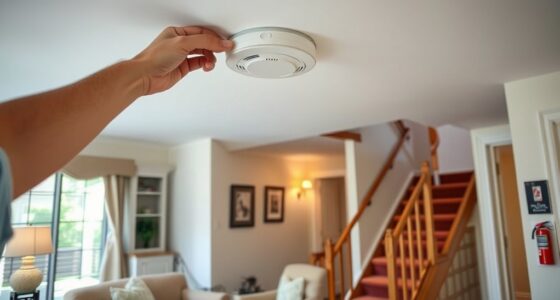Support for hearing loss is more than just devices; it involves maneuvering emotional ups and downs, challenging social stigma, and managing hidden costs. You’ll need to build personalized strategies and find ways to communicate effectively beyond technology. Emotional resilience and understanding your unique experience play a big role in adapting successfully. If you want to understand how to truly thrive with hearing loss, there’s more to discover that can make a difference.
Key Takeaways
- Emotional adjustment to hearing loss involves intense feelings that require self-acceptance and emotional resilience techniques.
- Social stigma and misconceptions can hinder support; educating others and challenging stereotypes improves acceptance.
- Support systems should be personalized, including tailored therapy, coaching, and peer groups for effective coping.
- Long-term device management includes understanding hidden costs, maintenance, and upgrade options to ensure device longevity.
- Emotional well-being and social connections are vital, and proactive support fosters confidence, resilience, and a positive outlook.
The Emotional Rollercoaster of Hearing Loss

Experiencing hearing loss can trigger a wide range of intense emotions that feel like an emotional rollercoaster. You might feel frustration, sadness, or even anger as you adjust to new challenges. During this time, self-acceptance becomes essential; acknowledging your feelings helps you move forward. Peer support plays a critical role in this journey, offering understanding and shared experiences that remind you you’re not alone. Connecting with others who face similar struggles can ease feelings of isolation and boost your confidence. Remember, it’s normal to experience ups and downs — embracing your emotions while seeking support helps you build resilience. Recognizing the impact of emotional reactions is vital to managing your mental health during this process. Over time, these feelings often stabilize, paving the way for acceptance and a more positive outlook on your hearing loss journey.
The Social Stigma and Misconceptions

Many people still judge those with hearing loss, often based on false beliefs or stereotypes. You might hear myths that hearing loss is rare or a sign of aging, but that’s not true. Challenging these misconceptions helps break down social barriers and fosters understanding.
Overcoming Social Judgment
Although social stigma around hearing loss can feel overwhelming, it’s important to recognize that misconceptions often stem from ignorance rather than malice. You might worry about peer acceptance or social inclusion, but remember, most people aren’t judging you—they simply lack understanding. By confidently explaining your needs and using assistive devices when necessary, you demonstrate that your hearing loss doesn’t define your worth. Surround yourself with supportive friends who value you beyond your hearing ability. Building open communication can reduce feelings of judgment and foster genuine connections. Overcoming social judgment is about shifting perceptions—showing others that you’re capable, engaged, and confident. Additionally, understanding that Dog names can be a fun way to express personality and uplift your spirits—just like choosing the right name can reflect your unique identity. Eventually, your resilience can help break down stereotypes, making social interactions more comfortable and inclusive for everyone.
Myths About Hearing Loss
Have you ever wondered if hearing loss is truly as misunderstood as people say? Many believe that hearing loss only affects the elderly or that it’s a sign of weakness. In reality, assistive technology like hearing aids and cochlear implants can profoundly improve quality of life. Unfortunately, social stigma still surrounds hearing loss, leading some to avoid seeking help. Some think that wearing hearing devices makes you look old or less capable, which isn’t true. Others believe that hearing loss is unavoidable or simply a normal part of aging, neglecting the importance of hearing conservation. These misconceptions prevent many from taking proactive steps toward better hearing health. Challenging these myths is essential to breaking down barriers and encouraging support and understanding.
Challenging Stereotypes
Challenging stereotypes about hearing loss is essential because social stigma often discourages people from seeking help. Many believe hearing loss is a sign of aging or weakness, which isn’t true. Assistive technology, like hearing aids and captioning devices, can dramatically improve quality of life, yet misconceptions prevent some from using them. Peer support plays a crucial role in changing attitudes by sharing real experiences and breaking down myths. When you connect with others who understand what you’re going through, it becomes easier to challenge negative beliefs. By openly discussing hearing loss and embracing assistive tech, you help normalize the condition. This not only boosts your confidence but also encourages others to seek support without fear of judgment. Understanding self watering plant pots can also teach us about nurturing and patience, which are vital when supporting someone with hearing loss.
The Hidden Costs of Hearing Aids and Devices

Hearing aids and devices often come with hidden costs that can catch you off guard. You’ll need to budget for ongoing maintenance, batteries, and accessories, which add up over time. Plus, replacements and upgrades can become significant expenses as technology advances. Additionally, some advanced hearing devices incorporate features like smart connectivity, which may require subscription services or app updates that incur extra costs.
Ongoing Maintenance Expenses
Even though hearing aids can substantially improve your quality of life, their ongoing maintenance costs often catch people off guard. Regular upkeep, like cleanings and software updates, is essential to keep your devices functioning properly. Insurance coverage varies widely; some plans cover repairs or replacements, but many don’t, leaving you to pay out of pocket. To manage these costs, consider maintenance plans offered by providers, which often include routine servicing and discounts on repairs. These plans can help reduce unexpected expenses and prolong the lifespan of your hearing aids. Staying proactive about maintenance ensures your devices perform at their best, but it’s important to understand what your insurance covers and to budget for ongoing expenses beyond the initial purchase. Additionally, understanding the contrast ratio of your devices can help ensure you get the best image quality for your home entertainment setup.
Battery and Accessory Costs
While the initial cost of hearing aids is significant, many users overlook the ongoing expenses for batteries and accessories that can add up over time. Batteries for assistive technology often need frequent replacement, which can become a recurring expense. Accessories like specialized cleaning tools, remote controls, or Bluetooth streamers also contribute to ongoing costs. These expenses can strain your budget if not planned for, even with insurance or discounts. Fortunately, funding options such as government assistance programs, grants, or manufacturer discounts may help offset some of these costs. Being aware of the long-term expenses ensures you’re prepared financially and can continue enjoying your hearing devices without surprises. Proper planning allows you to manage these hidden costs effectively and maintain your hearing support devices efficiently. Additionally, exploring anime movies and animated films that touch hearts can provide emotional support during challenging times, helping you stay positive as you navigate hearing loss.
Replacement and Upgrades
Over time, your hearing aids may need replacement or upgrades to maintain ideal performance, which can be a significant hidden cost. As technology advances, you might consider device upgrades to enjoy better sound quality and features. Replacement options include:
- Upgrading to newer models with improved noise reduction
- Replacing worn-out parts or batteries
- Switching to devices with advanced connectivity features
- Opting for a complete device replacement if repairs aren’t feasible
- Considering hearing aid maintenance to extend the lifespan of your devices and avoid premature replacements
These choices can be costly but are essential for excellent hearing. Knowing your options helps you plan financially and ensure your hearing aids continue to serve you well. Staying informed about upgrade cycles and replacement plans can save you money and frustration in the long run.
The Importance of Personalized Support Systems

Personalized support systems are essential because they recognize that each individual’s hearing loss experience is unique. You need custom support and tailored resources that fit your specific challenges. By focusing on your personal needs, these systems help you adapt more effectively and feel confident in managing your hearing health. A one-size-fits-all approach often falls short, so working with providers who offer customized solutions makes a real difference. Here’s a quick overview:
| Support Type | Benefits |
|---|---|
| Custom therapy programs | Targeted skill development |
| Tailored resources | Relevant information |
| Personal coaching | Ongoing motivation |
This personalized approach ensures you get the right tools and guidance, empowering you in your hearing journey. Additionally, incorporating techniques such as auditory feedback therapy can significantly enhance your self-monitoring skills, leading to better communication outcomes.
Overcoming Communication Barriers Beyond Technology

Although personalized support systems greatly improve your ability to manage hearing loss, effective communication also depends on skills and strategies that go beyond technology. To enhance your interactions, consider these approaches:
- Practice assistive communication techniques, such as rephrasing or asking for clarification.
- Engage in peer support groups to share tips and build confidence.
- Maintain eye contact to help you catch visual cues and facial expressions.
- Be proactive by informing others about your hearing needs, encouraging patience and understanding.
- Develop a deeper understanding of communication strategies to better navigate conversations and improve mutual understanding.
Navigating Emotional and Psychological Well-being

Living with hearing loss can take an emotional toll, affecting your confidence, mood, and overall well-being. To navigate this, focus on self-acceptance strategies that help you embrace your journey. Recognize your feelings without judgment and celebrate small victories. Incorporate emotional resilience techniques such as mindfulness and positive self-talk to strengthen your mindset. Connecting with others who understand your experience can also boost your emotional health, reminding you you’re not alone. Prioritize self-care and set realistic expectations, allowing yourself space to process emotions. Additionally, exploring electric bikes and their features can serve as a healthy distraction and a way to stay active. By actively practicing these strategies and techniques, you can build resilience, foster acceptance, and maintain your psychological well-being despite the challenges of hearing loss.
Frequently Asked Questions
How Do I Find Affordable Hearing Loss Support Services?
To find affordable hearing loss support services, start by researching clinics that offer sliding scale fees or payment plans. Check if your insurance coverage includes hearing aids and audiology visits, as this can markedly lower costs. Look into community health programs and non-profit organizations, which often provide free or low-cost services. Comparing options ensures you get the support you need without overspending, making hearing care more accessible.
What Are the Signs of Emotional Distress Related to Hearing Loss?
A picture is worth a thousand words, but hearing loss can make emotional distress harder to recognize. You might feel isolated, irritable, or anxious, which signals a decline in emotional well-being. Pay attention to changes in your mood or mental health awareness. If you notice these signs, seek support to protect your mental health, because addressing emotional distress early helps maintain your overall well-being and resilience.
Can Hearing Loss Impact Relationships Beyond Communication Issues?
Yes, hearing loss can impact your relationships beyond communication issues. You might notice emotional intimacy suffering as frustration or misunderstanding build. Social withdrawal can occur when you avoid gatherings or conversations, feeling anxious or overwhelmed. These changes can make your loved ones feel disconnected or rejected, further straining your bond. Recognizing these effects helps you address them early, fostering stronger emotional connections and encouraging open support and understanding.
Are There Support Groups Specifically for Younger Adults With Hearing Loss?
Yes, there are support groups specifically for younger adults with hearing loss. These groups often focus on teen support and peer connection, helping you share experiences and find understanding. Joining such groups can boost your confidence, provide valuable advice, and reduce feelings of isolation. You’ll meet others who truly get what you’re going through, making it easier to navigate challenges and celebrate successes together.
How Do I Choose the Right Hearing Aid for My Lifestyle?
To choose the right hearing aid for your lifestyle, consider your daily activities and environment. Look for hearing aid features like noise reduction, Bluetooth connectivity, and size that fits comfortably. Think about whether you need a discreet device or one with advanced features for active routines. Consult with an audiologist to match your lifestyle considerations with the appropriate technology, ensuring your hearing aid enhances your quality of life comfortably and effectively.
Conclusion
Hearing loss isn’t just about the ears—it’s a journey filled with unseen challenges and unexpected turns. As you navigate emotional hurdles, social misconceptions, and financial hurdles, remember that personalized support can make all the difference. But the true test lies ahead: will you uncover the hidden strengths within yourself to overcome the barriers that still remain? The path forward isn’t always clear, but your next step could change everything.









